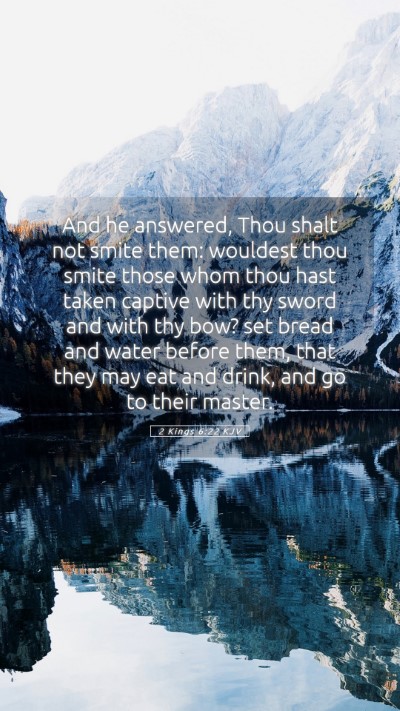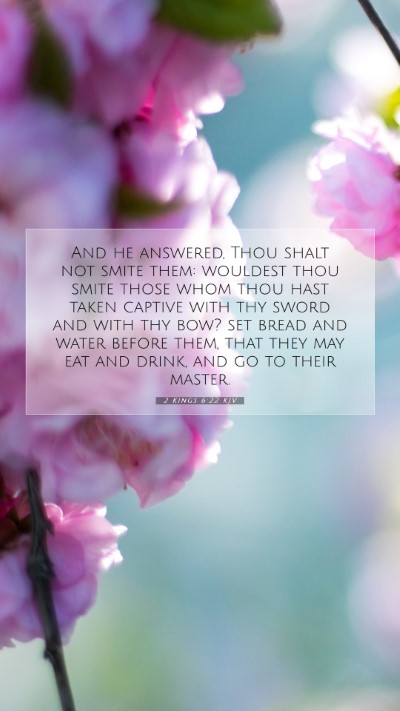Bible Verse Analysis: 2 Kings 6:22
Verse: “And he answered, Thou shalt not smite them: wouldest thou smite those whom thou hast taken captive with thy sword and with thy bow?” (2 Kings 6:22, KJV)
Overview
The context of this verse unfolds amid a tense situation between the Israelites and the Arameans. The prophet Elisha is involved in a miraculous event where God has blinded the enemy soldiers, and they have become captives through divine intervention. This verse encapsulates Elisha’s response to the proposal of retaliation against these enemies.
Insights from Commentaries
This comprehensive analysis draws upon insights from several public domain commentaries, including those by Matthew Henry, Albert Barnes, and Adam Clarke, providing a multifaceted understanding of this verse.
Matthew Henry's Commentary
Matthew Henry highlights the mercy reflected in Elisha's response. He emphasizes that killing one’s captives is a violation of divine principles of mercy and justice. Henry points out that Elisha's refusal to smite the Arameans illustrates a profound lesson about compassion, even toward one’s enemies.
Albert Barnes' Notes
Albert Barnes elaborates on the moral implications of Elisha's stance. He notes that although the captives could be seen as enemies deserving punishment, Elisha chooses to show mercy. Barnes remarks that this act serves as a larger symbolism of God’s disposition toward sinners—choosing grace over judgment.
Adam Clarke's Commentary
Adam Clarke provides an understanding of the historical context, noting that the Arameans were indeed acting against Israel but were delivered into their hands by divine intervention. Clarke adds that Elisha's approach urges readers to consider the nature of divine authority and how God desires His people to act—favoring reconciliation and kindness over vengeance.
Key Themes
- Divine Mercy: The text exemplifies God’s desire for mercy, urging followers to respond to hostility with grace.
- Ethical Conduct: It raises questions about the morality of warfare and revenge, highlighting an ethical framework for interactions even with adversaries.
- Prophetic Role: Elisha’s prophetic insight emphasizes his leadership and the authority granted by God in making decisions contrary to natural impulses.
- Symbolism of Captivity: The captives symbolize the broader human condition—held captive by sin, yet deserving of compassion.
Application to Daily Life
In examining 2 Kings 6:22, modern readers are encouraged to reflect on their responses to conflict and adversity. Applying Bible verses to daily life means learning to choose mercy over retaliation, seeking reconciliation, and understanding the complexity of human relationships.
Bible Study Insights
This interaction invites those engaging in Bible study groups or online Bible study to explore themes of forgiveness and mercy through structured discussions. Engaging with this verse in study settings can deepen understanding and promote practical applications such as resolving personal conflicts through mercy.
Cross References
- Matthew 5:7: “Blessed are the merciful: for they shall obtain mercy.”
- Romans 12:19: “Dearly beloved, avenge not yourselves, but rather give place unto wrath: for it is written, Vengeance is mine; I will repay, saith the Lord.”
- Luke 6:27: “But I say unto you which hear, Love your enemies, do good to them which hate you.”


